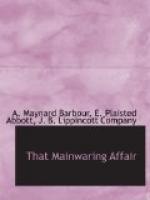“As soon as my studies were completed, I sailed for America, with the avowed determination of securing further evidence regarding the will, and of establishing my claim to the property fraudulently withheld from my father and from myself. In the securing of the necessary evidence I succeeded beyond my expectations. As Hugh Mainwaring’s private secretary, I gained access to the files of his personal letters, and soon was familiar with the entire correspondence between himself and Richard Hobson, from which I learned that the latter demanding and receiving large sums of money as the price of his silence regarding some past fraudulent transaction. The nature of that transaction, I ascertained in this marginal note, in Hugh Mainwaring’s handwriting, upon one of Hobson’s letters which happened to be more insolent in its tone than the rest. With the permission of the court I will read it:
“’He insinuates that I destroyed the will; I only gave him to understand that it was lost. Little he dreams it is still in my possession and will be, until such time as I, too, have to make final disposition of my estate! Why I did not destroy it, or why I do not, now that the property is rightfully mine, I cannot say, except that I dare not! “Thus conscience does make cowards of us all?"’
“With the discovery of these words,” concluded the witness, “began my search for the will itself.”
“From the discovery of this letter which led you to believe the will was still in existence, you prosecuted your search for the document until the 7th of last July?”
“Yes, sir, whenever an opportunity for search was offered.”
“Where did you finally find the will?”
“In the safe, in Mr. Mainwaring’s private apartments at Fair Oaks.”
“On July 7 last?”
“Yes, sir.”
“That was the day on which you, acting as Hugh Mainwaring’s secretary, had drawn, at his dictation, his last will and testament, was it not?”
“It was.”
“Mr. Mainwaring,” said the attorney, deliberately, his eye quick to read the faces about him, “is there in your mind any connection between that event and your discovery of this will?”
“Only the most indirect,” was the reply, given with equal deliberation. “The fact that Hugh Mainwaring was making final disposition of his property naturally spurred me on to increased action, since, in making final adjustment of his papers, he would be more than likely to destroy the old will. This incentive, together with the fact that opportunity was given me for a more thorough search than I had been able to make prior to that time, combined to bring about the discovery of the will.”
“Please state the time and circumstances of your finding it.”
“I found it late in the afternoon, while Mr. Mainwaring and his guests had gone for a long drive. I determined to leave no place unexplored where it could possibly be concealed; after about an hour’s search I found it.”




